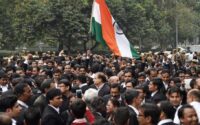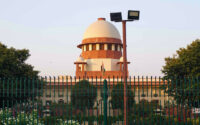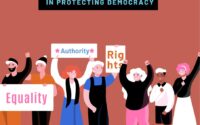IMPLICATIONS ON THE LAW OF INTELLECTUAL PROPERTY DURING THE PANDEMIC
This article is written by Heena Jalan, a student of School of Law, KIIT University.
The coronavirus situation has highlighted many concerns for countries all over the world. Since the Pandemic, government bodies from around the world are striving hard to implement appropriate regulations to reduce the corporate and commercial tensions. A global unconventional issue that everyone is motivated at, is the need to relax or suspend the laws of Intellectual Property (IP) to combat this virus. To fight this canker there is an exigent requirement of masks, Continuous positive airway pressure (CPAP) masks, personal protection equipment (PPE), syringe, gloves, gowns, ventilators, medicines and other medical equipment.
Applications for Clinical Trial permission and application to import or manufacture drug/vaccine for sale and distribution would be processed on priority through expedited review/accelerated approval. Any firm having a drug/vaccine already approved for COVID-19 in any other country can directly approach DCG(I) through Public Relations Office regarding expedited review/accelerated marketing in India.
As we know, the entire medical industry is comprehensively secured by patent rights. In such times of crisis where the entire world is wrestling and where there is a heavy requirement of medical essentials, there is a lack of manufacturers since all the essentials that are required by the medical industry are patented. Due to this pandemic, the trade industry has also seen a set-back making it difficult for other countries to obtain essential medicines and medical equipment from other countries. In a study it was revealed that approximately, 90% of the pre-drug chemicals which are used to make drugs in the U.S. are imported mainly from India and China in U.S. Currently, the U.S. is facing an acute shortage of the essential equipment and antibiotics. Doctors in different countries are designing 3D prints of CPAP hoods and ventilators due to a shortage of machine parts which might cause the doctors to be dragged in courts for patent infringement. The government needs to be proactive in implementing regulations to either relax or suspend the IP rights for a temporary period since worldwide there is a sturdy shortage of critical medical equipment.
The shortfall in local production on account of manpower, import constraints on the supply of essential commodities and the inability of the patent owners to organize mass production of the medical equipment demands for relaxing/suspending/regulating appropriate intellectual property laws. As it allows appropriate businesses to mass-produce essential medical equipment or drugs. This can be monitored by a central authority so that the quality of the goods produced is not an issue. Since fraud in these times are common.
In 1998, Michael Kremer, a development economist, proposed a system of “patent buyouts”, according to which the government will temporarily acquire the rights to the invention of great public importance, but only during the critical times or state emergencies. The same could be out in the public domain so that it is feasible for the manufacturers to manufacture the medical devices. By way of an auction, the government can give the contract of manufacturing patented products to potential bidders at their professed values and ensure that patents procured by these bidders are owned and licensed by the government.
Grant compulsory licensing of the patented product to other manufacturers, specifically only during this health emergency. Article 73 of the Trade-Related Intellectual Property Rights (TRIPS Agreement) was invoked, which states that nothing in the agreement shall construe a member from taking any action which it considers necessary for the protection of its essential security interests. The application of this exception to manufacture the patented products in the wake of COVID-19 is legally justified. The regulation of a law similar to Title 28 of U.S. Code Section 1498, wherein a manufacturer cannot be held liable for patent infringement when it makes products for the U.S. Instead, the patent owner is restricted to bringing a lawsuit against the government in the U.S. Court of Federal Claims, in all countries.
Through a notification X-11026/07/2020-PRO dated 19.03.2020, the Directorate General of Health Services, Central Drug Standard Control Organization has relaxed certain laws to accelerate the treatment of COVID-19 and stated that:
The World Health Organization director-general Tedros Adhanom Ghebreyesus proposed a systematic plan to create a voluntary pool of IP rights for patents and data relating to tests, vaccines, and equipment of COVID-19. The same was supported after this was proposed by the Costa Rica Government. It was proposed to provide free access or licensing on realistic and affordable footings for all countries. It also advised other countries, research centers, institutions to open access to their research, data and further also open collaborations so that all countries could take benefit of the science and research.
Another scheme that is proposed is the creation of the “Open COVID Pledge”. The Pledge permits anyone to use intellectual property which is otherwise not available to the common public. A model license is available which grants permission to use the IP and technology from December 01, 2019, and the same is effective until one year after WHO declares COVID-19 to have ended.
Some Organizations that have signed the pledge so far are Intel, Fabricatorz Foundation, Unified Patents, Creative Commons, Mozilla, DLA Piper, Center for Law and Biomedical Sciences at The University of Utah’s S.J. Quinney College of Law, The Center for Compassion and Altruism Research and Education at Stanford.
Yes, currently worrying about IP litigation is not the kind of priority any country is wanting during this pandemic but what is also crucial right now is to legislate laws and regulations which will further prove to be useful to combat coronavirus.


